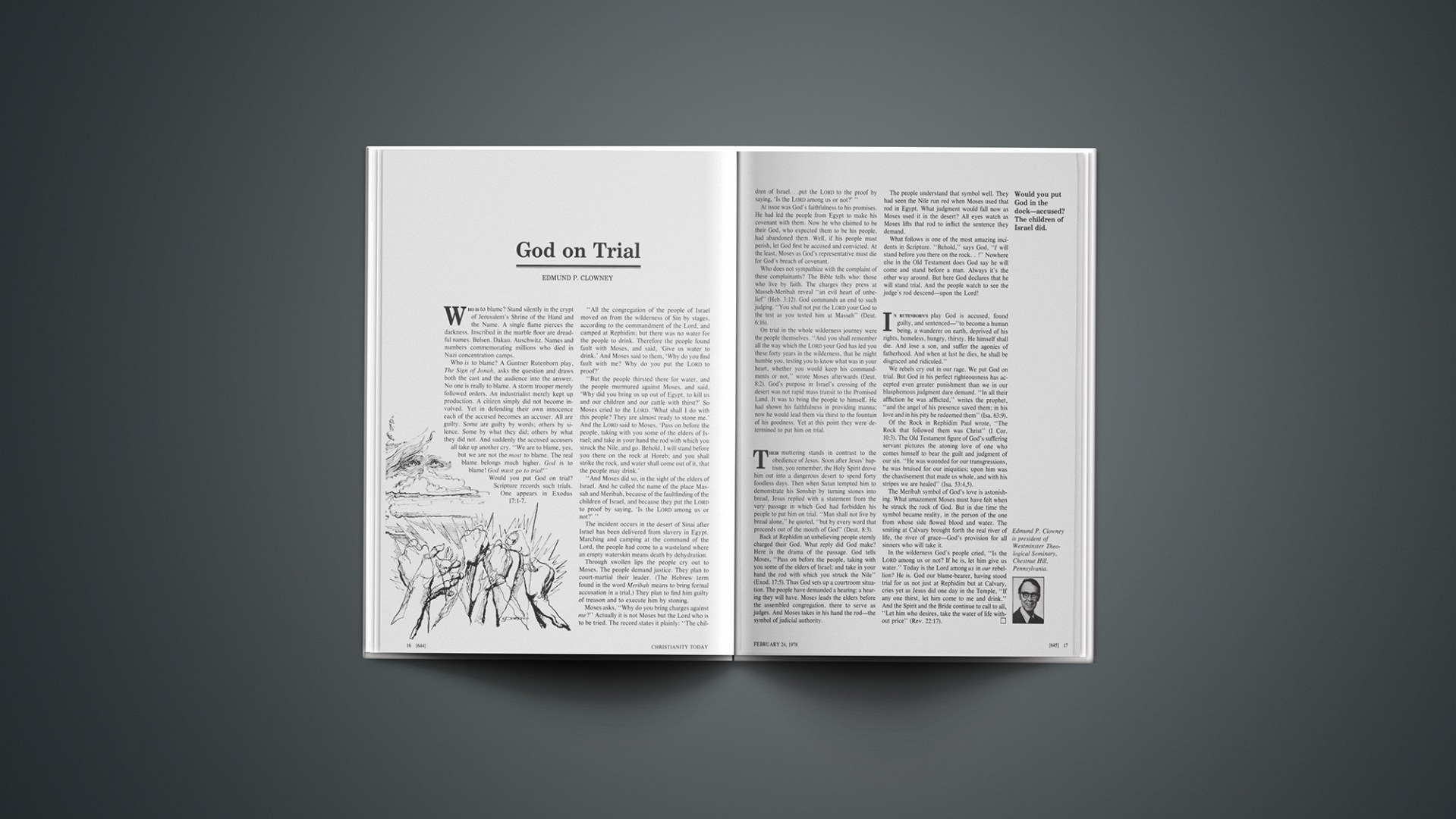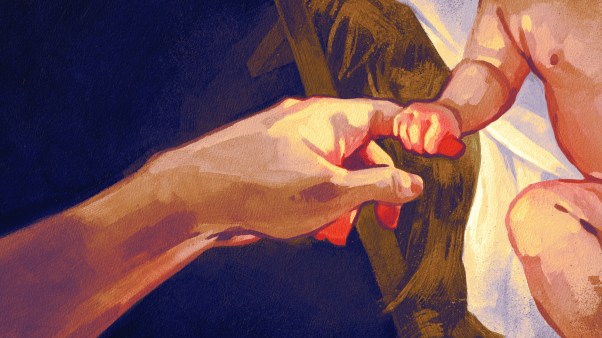Who is to blame? Stand silently in the crypt of Jerusalem’s Shrine of the Hand and the Name. A single flame pierces the darkness. Inscribed in the marble floor are dreadful names. Belsen. Dakau. Auschwitz. Names and numbers commemorating millions who died in Nazi concentration camps.
Who is to blame? A Guntner Rutenbom play, The Sign of Jonah, asks the question and draws both the cast and the audience into the answer. No one is really to blame. A storm trooper merely followed orders. An industrialist merely kept up production. A citizen simply did not become involved. Yet in defending their own innocence each of the accused becomes an accuser. All are guilty. Some are guilty by words; others by silence. Some by what they did; others by what they did not. And suddenly the accused accusers all take up another cry. “We are to blame, yes, but we are not the most to blame. The real blame belongs much higher. God is to blame! God must go to trial!”
Would you put God on trial? Scripture records such trials. One appears in Exodus 17:1–7.
“All the congregation of the people of Israel moved on from the wilderness of Sin by stages, according to the commandment of the Lord, and camped at Rephidim; but there was no water for the people to drink. Therefore the people found fault with Moses, and said, ‘Give us water to drink.’ And Moses said to them, ‘Why do you find fault with me? Why do you put the LORD to proof?’
“But the people thirsted there for water, and the people murmured against Moses, and said, ‘Why did you bring us up out of Egypt, to kill us and our children and our cattle with thirst?’ So Moses cried to the LORD. ‘What shall I do with this people? They are almost ready to stone me.’ And the LORD said to Moses, ‘Pass on before the people, taking with you some of the elders of Israel; and take in your hand the rod with which you struck the Nile, and go. Behold, I will stand before you there on the rock at Horeb; and you shall strike the rock, and water shall come out of it, that the people may drink.’
“And Moses did so, in the sight of the elders of Israel. And he called the name of the place Massah and Meribah, because of the faultfinding of the children of Israel, and because they put the LORD to proof by saying, ‘Is the LORD among us or not?’ ”
The incident occurs in the desert of Sinai after Israel has been delivered from slavery in Egypt. Marching and camping at the command of the Lord, the people had come to a wasteland where an empty waterskin means death by dehydration.
Through swollen lips the people cry out to Moses. The people demand justice. They plan to court-martial their leader. (The Hebrew term found in the word Meribah means to bring formal accusation in a trial.) They plan to find him guilty of treason and to execute him by stoning.
Moses asks, “Why do you bring charges against me?” Actually it is not Moses but the Lord who is to be tried. The record states it plainly: “The children of Israel … put the LORD to the proof by saying, ‘Is the LORD among us or not?’ ”
At issue was God’s faithfulness to his promises. He had led the people from Egypt to make his covenant with them. Now he who claimed to be their God, who expected them to be his people, had abandoned them. Well, if his people must perish, let God first be accused and convicted. At the least, Moses as God’s representative must die for God’s breach of covenant.
Who does not sympathize with the complaint of these complainants? The Bible tells who: those who live by faith. The charges they press at Masseh-Meribah reveal “an evil heart of unbelief” (Heb. 3:12). God commands an end to such judging. “You shall not put the LORD your God to the test as you tested him at Masseh” (Deut. 6:16).
On trial in the whole wilderness journey were the people themselves. “And you shall remember all the way which the LORD your God has led you these forty years in the wilderness, that he might humble you, testing you to know what was in your heart, whether you would keep his commandments or not,” wrote Moses afterwards (Deut. 8:2). God’s purpose in Israel’s crossing of the desert was not rapid mass transit to the Promised Land. It was to bring the people to himself. He had shown his faithfulness in providing manna; now he would lead them via thirst to the fountain of his goodness. Yet at this point they were determined to put him on trial.
Their muttering stands in contrast to the obedience of Jesus. Soon after Jesus’ baptism, you remember, the Holy Spirit drove him out into a dangerous desert to spend forty foodless days. Then when Satan tempted him to demonstrate his Sonship by turning stones into bread, Jesus replied with a statement from the very passage in which God had forbidden his people to put him on trial. “Man shall not live by bread alone,” he quoted, “but by every word that proceeds out of the mouth of God” (Deut. 8:3).
Back at Rephidim an unbelieving people sternly charged their God. What reply did God make? Here is the drama of the passage. God tells Moses, “Pass on before the people, taking with you some of the elders of Israel; and take in your hand the rod with which you struck the Nile” (Exod. 17:5). Thus God sets up a courtroom situation. The people have demanded a hearing; a hearing they will have. Moses leads the elders before the assembled congregation, there to serve as judges. And Moses takes in his hand the rod—the symbol of judicial authority.
The people understand that symbol well. They had seen the Nile run red when Moses used that rod in Egypt. What judgment would fall now as Moses used it in the desert? All eyes watch as Moses lifts that rod to inflict the sentence they demand.
What follows is one of the most amazing incidents in Scripture. “Behold,” says God, “I will stand before you there on the rock …!” Nowhere else in the Old Testament does God say he will come and stand before a man. Always it’s the other way around. But here God declares that he will stand trial. And the people watch to see the judge’s rod descend—upon the Lord!
In rutenborn’s play God is accused, found guilty, and sentenced—“to become a human being, a wanderer on earth, deprived of his rights, homeless, hungry, thirsty. He himself shall die. And lose a son, and suffer the agonies of fatherhood. And when at last he dies, he shall be disgraced and ridiculed.”
We rebels cry out in our rage. We put God on trial. But God in his perfect righteousness has accepted even greater punishment than we in our blasphemous judgment dare demand. “In all their affliction he was afflicted,” writes the prophet, “and the angel of his presence saved them; in his love and in his pity he redeemed them” (Isa. 63:9).
Of the Rock in Rephidim Paul wrote, “The Rock that followed them was Christ” (1 Cor. 10:3). The Old Testament figure of God’s suffering servant pictures the atoning love of one who comes himself to bear the guilt and judgment of our sin. “He was wounded for our transgressions, he was bruised for our iniquities; upon him was the chastisement that made us whole, and with his stripes we are healed” (Isa. 53:4, 5).
The Meribah symbol of God’s love is astonishing. What amazement Moses must have felt when he struck the rock of God. But in due time the symbol became reality, in the person of the one from whose side flowed blood and water. The smiting at Calvary brought forth the real river of life, the river of grace—God’s provision for all sinners who will take it.
In the wilderness God’s people cried, “Is the LORD among us or not? If he is, let him give us water.” Today is the Lord among us in our rebellion? He is. God our blame-bearer, having stood trial for us not just at Rephidim but at Calvary, cries yet as Jesus did one day in the Temple, “If any one thirst, let him come to me and drink.” And the Spirit and the Bride continue to call to all, “Let him who desires, take the water of life without price” (Rev. 22:17).
D. Bruce Lockerbie is chairman of the Fine Arts department at The Stony Brook School, Stony Brook, New York. This article is taken from his 1976 lectures on Christian Life and Thought, delivered at Conservative Baptist Theological Seminary in Denver, Colorado.










